The Cook's Illustrated Cookbook (153 page)
Read The Cook's Illustrated Cookbook Online
Authors: The Editors at America's Test Kitchen
Tags: #Cooking

![]() WHY THIS RECIPE WORKS
WHY THIS RECIPE WORKS
Roasting chicken in the oven is the usual route to crisp skin, but sometimes your oven is crowded with side dishes or dessert. We wanted to cook chicken entirely on the stovetop—and we wanted crisp, golden skin, evenly cooked meat, and a flavorful pan sauce. In addition, we wanted this recipe to be relatively quick, so we opted not to brine. We tried simply browning the chicken and then turning down the heat to cook it through; we also tried browning the chicken and then adding some liquid to the pan, but neither approach worked. Nor did reversing the order of the steps—steaming the chicken and then searing. After trying every possible approach, we realized a multistep process of searing the chicken, steaming it, and then searing it again gave us the results we wanted. With a flavorful fond left in the skillet, we made a quick pan sauce with shallot, lemon juice, herbs, and butter.
SERVES 4
A whole 4-pound chicken, cut into 8 pieces, can be used instead of the chicken parts. If using large chicken breasts (about 1 pound each), cut each breast into 3 pieces. If using smaller breasts (10 to 12 ounces each), cut each breast into 2 pieces.
CHICKEN
3¹⁄ | pounds bone-in chicken pieces (split breasts cut in half, drumsticks, and/or thighs), trimmed |
Salt and pepper | |
1 | tablespoon vegetable oil |
³⁄ | cups low-sodium chicken broth |
SAUCE
1 | teaspoon vegetable oil |
1 | shallot, minced |
1 | teaspoon all-purpose flour |
1¹⁄ | tablespoons minced fresh parsley |
1¹⁄ | tablespoons minced fresh chives |
1 | tablespoon lemon juice |
1 | tablespoon unsalted butter, chilled |
Salt and pepper |
1. FOR THE CHICKEN:
Pat chicken dry with paper towels and season with salt and pepper. Heat 2 teaspoons oil in 12-inch nonstick skillet over medium-high heat until just smoking. Place chicken skin side down in skillet and cook until well browned, 6 to 8 minutes, reducing heat if pan begins to scorch. Flip chicken skin side up. Reduce heat to medium-low, add ³⁄
4
cup of broth to skillet, cover, and cook until breast pieces register 155 degrees and thighs and/or drumsticks register 170 degrees, 10 to 16 minutes. Transfer chicken to plate, skin side up.
2.
Pour off all liquid from skillet into liquid measuring cup and reserve. Wipe out skillet with paper towels. Heat remaining 1 teaspoon oil in now-empty skillet over medium-high heat until shimmering. Return chicken, skin side down, to skillet and cook undisturbed until skin is deep golden brown and crisp, breast pieces register 160 degrees, and thighs and/or drumsticks register 175 degrees, 4 to 7 minutes. (Smaller pieces may cook faster than larger pieces. Remove pieces from skillet as they reach correct temperature.) Transfer chicken to serving platter and tent loosely with aluminum foil. Using spoon, skim any fat from reserved cooking liquid and add enough broth to measure ³⁄
4
cup.
3. FOR THE SAUCE:
Heat oil in now-empty skillet over low heat. Add shallot and cook, stirring often, until softened, about 2 minutes. Add flour and cook, stirring constantly, for 30 seconds. Increase heat to medium-high and slowly whisk in reserved cooking liquid, scraping up any browned bits. Bring to rapid simmer and cook until reduced to ¹⁄
2
cup, 2 to 3 minutes. Stir in any accumulated chicken juices; return to simmer, and cook for 30 seconds. Off heat, whisk in parsley, chives, lemon juice, and butter. Season with salt and pepper to taste. Pour sauce around chicken and serve immediately.
Omit sauce ingredients. Add ¹⁄
4
cup sugar, 2 tablespoons lime juice, 1 tablespoon fish sauce, 2 minced garlic cloves, and 1 teaspoon Thai red curry paste to now-empty skillet in step 3. Cook over medium-high heat, scraping up any browned bits, until sauce is thickened and spoon leaves wide trail when dragged through sauce, about 2 minutes. Stir in reserved cooking liquid, return to simmer, and cook until reduced to ¹⁄
2
cup, 2 to 3 minutes. Stir in any accumulated chicken juices; return to simmer, and cook for 30 seconds. Off heat, stir in 2 tablespoons chopped fresh cilantro and 1 tablespoon lime juice. Pour sauce around chicken and serve immediately.
Omit sauce ingredients. Cut away rind and pith from 1 grapefruit. Cut segments into ¹⁄
2
-inch pieces and reserve ¹⁄
2
cup juice. Heat 1 teaspoon vegetable oil in now-empty skillet over medium-high heat in step 3. Add 1 minced shallot and cook, stirring often, until softened, about 2 minutes. Stir in reserved cooking liquid and reserved grapefruit juice, scraping up any browned bits. Bring to rapid simmer and cook until reduced to ¹⁄
4
cup, 4 to 6 minutes. Stir in grapefruit segments, 1 tablespoon honey, and any accumulated chicken juices; return to simmer and cook for 30 seconds. Off heat, stir in 1 tablespoon chopped fresh tarragon and 1 tablespoon chilled butter. Season with salt and pepper to taste. Pour sauce around chicken and serve immediately.
Omit sauce ingredients. Whisk 3 tablespoons sugar, 3 tablespoons soy sauce, and 1 teaspoon cornstarch together in bowl. Add ³⁄
4
cup sake, reserved cooking liquid, and soy sauce mixture to now-empty skillet in step 3. Cook over medium-high heat, scraping up any browned bits, until reduced to ¹⁄
2
cup, about 6 minutes. Stir in any accumulated chicken juices; return to simmer, and cook for 30 seconds. Off heat, whisk in 2 tablespoons chilled butter and 2 tablespoons thinly sliced scallion. Pour sauce around chicken and serve immediately.
![]() WHY THIS RECIPE WORKS
WHY THIS RECIPE WORKS
Roasting chicken should be a simple affair, but getting the white and dark meat to cook at the same rate while also developing crisp, golden skin is often a challenge. After testing almost every variable we could think of—oven temperature, turning the bird halfway through cooking, basting, and trussing—we found that roasting a chicken is actually quite easy as long as you use the proper technique. Roasting the chicken at 400 degrees for the duration of cooking (rather than adjusting the temperature partway) worked best. Continuous basting didn’t improve our roast chicken; we found that applying butter under the skin and rubbing the bird with olive oil before it went into the oven gave it great color and a crisp texture. Trussing also proved unnecessary; the dark meat cooked more quickly when left untrussed. The only extra step we found truly important was turning the bird twice for evenly cooked meat and crisp, browned skin.
See “CARVING A WHOLE ROASTED CHICKEN” illustrations that follow recipe.
SERVES 2 TO 3
If using kosher chicken, do not brine in step 1, and season with salt as well as pepper in step 3. We recommend using a V-rack to roast the chicken. If you don’t have a V-rack, set the bird on a regular roasting rack and use balls of aluminum foil to keep the roasting chicken propped up on its side.
¹⁄ | cup salt |
¹⁄ | cup sugar |
1 | (3-pound) whole chicken, giblets discarded |
2 | tablespoons unsalted butter, softened |
1 | tablespoon olive oil |
Pepper |
1.
Dissolve salt and sugar in 2 quarts cold water in large container. Submerge chicken in brine, cover, and refrigerate for 1 hour. Remove chicken from brine and pat dry with paper towels.
2.
Adjust oven rack to lower-middle position, place roasting pan on rack, and heat oven to 400 degrees. Coat V-rack with vegetable oil spray and set aside.
3.
Use your fingers to gently loosen center portion of skin covering each breast; place butter under skin, directly on meat in center of each breast. Gently press on skin to distribute butter over meat. Tuck wings behind back. Rub skin with oil, season with pepper, and place chicken, wing side up, on prepared V-rack. Place V-rack in preheated roasting pan and roast for 15 minutes.
4.
Remove roasting pan from oven and, using 2 large wads of paper towels, rotate chicken so that opposite wing side is facing up. Return roasting pan to oven and roast for another 15 minutes.
5.
Using 2 large wads of paper towels, rotate chicken again so that breast side is facing up and continue to roast until breast registers 160 degrees and thighs register 175 degrees, about 20 to 25 minutes longer. Transfer chicken to carving board and let rest for 10 minutes. Carve and serve immediately.
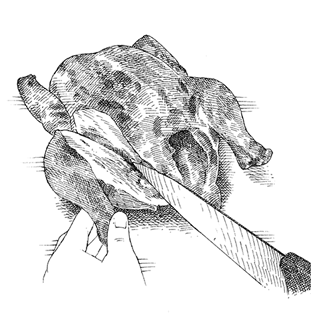
1.
Cut chicken where leg meets breast.
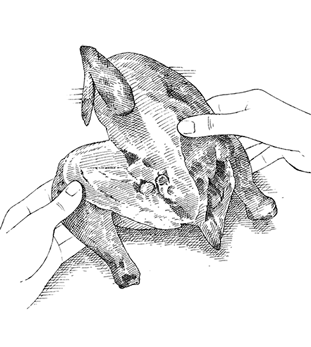
2.
Pull leg quarter away from carcass. Separate joint by gently pressing leg out to side and pushing up on joint.
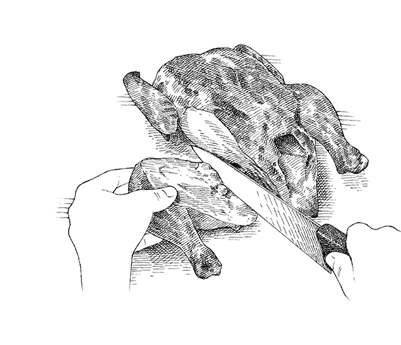
3.
Carefully cut through joint to remove leg quarter.

4.
Cut through joint that connects drumstick to thigh. Repeat on second side to remove other leg.
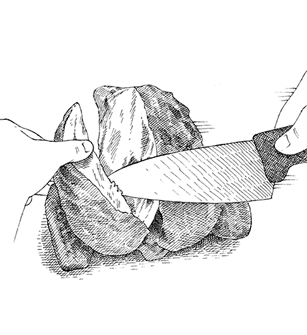
5.
Cut down along one side of breastbone, pulling breast meat away from you as you cut.
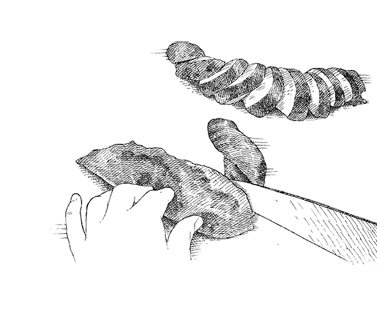
6.
Remove wing from breast by cutting through wing joint. Slice breast into attractive slices.